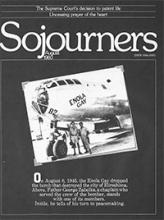My preacher grandfather, Bernard Uphaus, lived with us during the first 11 of my 90 years. He had been an itinerant minister of the Evangelical Association, a splinter of Methodism, and served a German constituency. I often heard of his long horseback rides from parish to parish ministering to the people, many of whom lived a poor, precarious existence. He told of snow drifting through the roofs onto his bed. "They gave me the best they had," Grandfather explained.
Had Grandfather been an acquisitive capitalist instead of a dedicated minister of the gospel, I might today be a third generation parasite, for at one time he owned 80 acres that now lie inside Chicago. He traded 40 for a horse and saddle and sold the second 40 for a pittance.
During 17 years of the Great Depression, as I traveled from city to city for the National Religion and Labor Foundation, I sat up all night in coaches or rode in an upper of an old-fashioned Pullman car. I was proud to follow in Grandfather's train as an itinerant, as I organized ministers, laypeople, and trade union leaders into fellowships in support of workers' rights. It was simply the business of biblical justice applied to the lives of the hungry and unemployed. With $100 a month as salary and usually only enough in pocket to buy a ticket to the next town, my eyes were opened to the relationship between social misery and the structures of a broken-down economy.
Grandfather's God was both awe-full and tender. At meals Grandfather's grace brought together a beneficent Creator and the food on the table. His singing reverberated throughout the house.
Read the Full Article

